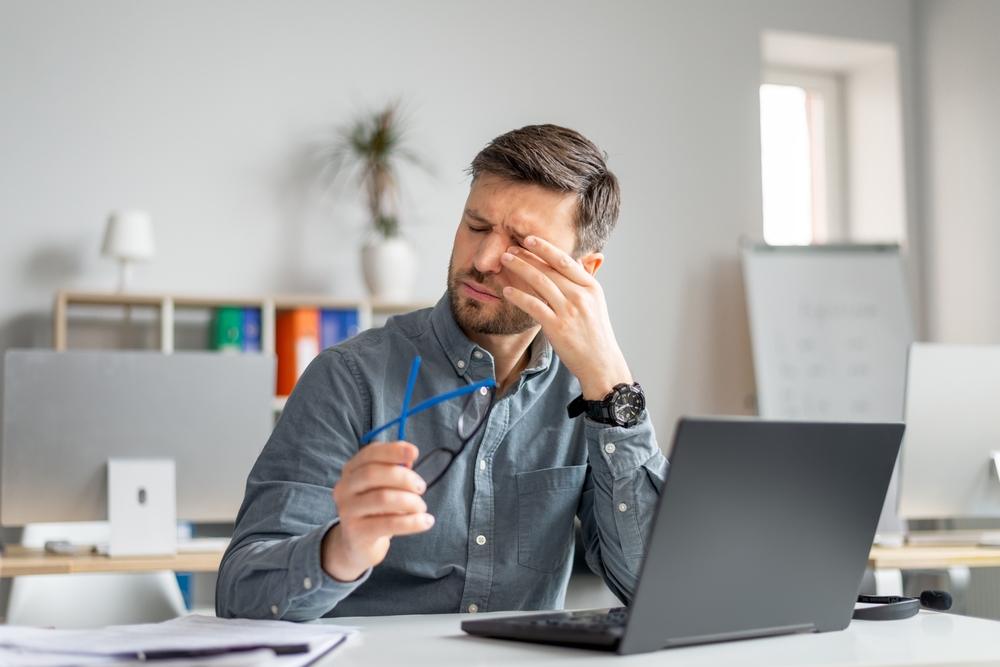
In our modern society, digital devices have become an integral part of our daily lives. From our smartphones to our laptops, we are constantly exposed to screens that emit light and radiation. What many people don't realize, however, is the impact these digital devices can have on our eyes, specifically causing what is commonly known as dry eyes.
The Connection Between Digital Devices and Dry Eyes
When we use digital devices, our eyes are exposed to a constant stream of light and radiation. This, coupled with the fact that we tend to blink less when focusing on a screen, can lead to dry eyes. The blue light emitted by these devices can also strain our eyes, further exacerbating the problem.
The prolonged use of digital devices means our eyes are continually working to focus and readjust to the light and images on the screen. This excessive use can strain the muscles in our eyes, leading to fatigue, and in turn, dry eyes. We often ignore these symptoms, brushing them off as a normal part of our digital lives, but the reality is, dry eyes can significantly affect our quality of life.
The position of our digital devices can also contribute to dry eyes. Most of us hold our devices below eye level, forcing us to look down for extended periods. This position can lead to a greater evaporation of tears, causing our eyes to become dry.
The Impact of Digital Devices on Dry Eyes
Several studies have been conducted to understand the impact of digital devices on dry eyes. One such study published in the Journal of Medical Internet Research found that people who spent more than four hours a day on digital devices were more likely to experience symptoms of dry eyes.
Another study, published in the American Journal of Ophthalmology, found a direct correlation between the duration of digital device use and the severity of dry eye symptoms. The researchers concluded that prolonged use of digital devices, particularly smartphones, significantly increases the risk of dry eyes.
These findings underscore the importance of being mindful of our digital device use. It's not just about limiting our screen time, but also about incorporating healthy habits into our digital lives to mitigate the effects of these devices on our eyes.
Tips for Relief: How to Mitigate the Effects of Digital Devices on Eyes
There are several practical steps you can take to alleviate your symptoms and protect your eyes.
Firstly, take regular breaks from your screen. The American Academy of Ophthalmology recommends the 20-20-20 rule: every 20 minutes, take a 20-second break and look at something 20 feet away. This helps relax the eye muscles and reduce strain.
Secondly, consider the position of your device. As mentioned earlier, holding your device below eye level can cause your eyes to dry out. Try to keep your device at eye level or slightly above to minimize this effect.
Lastly, remember to blink frequently. Blinking helps to distribute tears evenly across your eyes, keeping them moist. When we're focused on a screen, we tend to blink less, so make a conscious effort to blink more often.
Practical Steps to Protect Your Eyes While Using Digital Devices
In addition to the above tips, there are other practical steps you can take to protect your eyes from the effects of digital devices.
Ensure your workspace is well-lit and that the brightness of your device is not too high. This can help reduce the strain on your eyes. Also, consider investing in a screen filter or glasses that block blue light. These can help protect your eyes from the potentially harmful effects of blue light emitted by digital devices.
Stay hydrated and maintain a healthy diet. Your diet can greatly influence your eye health. Foods rich in omega-3 fatty acids, such as fish and flaxseeds, can help maintain the quality of your tears, preventing dry eyes.
Finally, make sure you have regular eye check-ups. Regular eye exams can help detect any issues early and ensure your eyes are in good health.
When to Seek Medical Assistance
While the tips provided can certainly help alleviate dry eyes caused by digital devices, it's important to know when to seek professional help. If your symptoms persist despite following the above recommendations, it may be time to consult an eye care professional.
Dry eyes can be a symptom of other underlying health conditions, such as blepharitis, Sjögren's syndrome, or even certain medications. An eye care professional can conduct a thorough examination to identify the underlying cause of your dry eyes and recommend appropriate treatment.
Your eyes are a vital part of your overall health. Don't ignore persistent symptoms or discomfort. Seeking professional help early can prevent further damage and ensure your eyes remain healthy in the long run.
Balancing Digital Device Use and Eye Health
While digital devices have become a necessary part of our lives, it's crucial to balance their use with our eye health. By understanding the connection between digital devices and dry eyes, implementing the tips for relief and taking practical steps to protect our eyes, we can ensure that our digital lives don't come at the cost of our eye health.
For more information on the impact of digital devices on dry eyes and tips for relief, visit Fort Mill Vision Center at our office in Fort Mill, South Carolina. Call (803) 547-5547 to discuss any questions with our team of experts or to schedule an appointment today.









